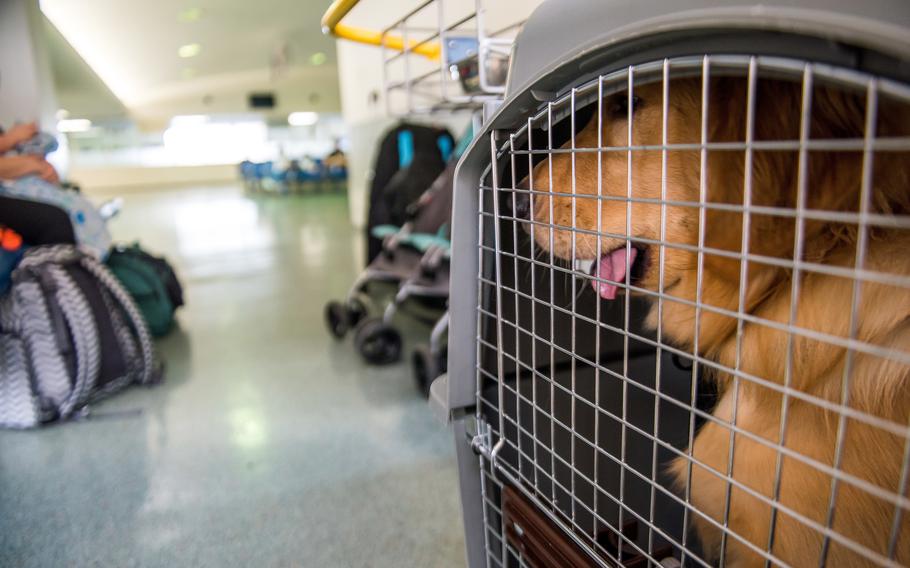
A dog that traveled on a Patriot Express flight sits in its kennel inside the passenger terminal at Yokota Air Base, Japan, in 2018. (Gabrielle Spalding/U.S. Air Force)
Due to public outcry, the Centers for Disease Control and Prevention has eased restrictions on dogs coming into the United States from countries with low or no risk of rabies.
The CDC announced Monday that it will require just one form from dog owners entering the U.S. with their pets instead of a package of documents it set forth earlier this month in new regulations.
“These updates incorporate the feedback received from the public, industry partners, and various countries on the dog importation rule, and clarify and simplify the processes for those bringing dogs from dog rabies-free or low-risk countries,” the CDC’s official website states.
The rules will still take effect Aug. 1, the tail end of the military’s busy season for permanent changes of duty stations, which typically occurs from May to August.
Under the latest revisions, dogs that have spent the previous six months in a country free of or at low risk for canine rabies will need only the free CDC Dog Import Form available online.
The pet owner may complete the form on the day of travel, according to the CDC’s website. The document may be printed or shown on a phone screen to U.S. customs officials or airline representatives.
Dogs still must be microchipped and at least 6 months old at time of entry to the U.S. and appear healthy upon arrival.
Meeting all the new requirements to bring a dog into the U.S. can be pricey. To obtain a health certificate, dogs may undergo preliminary requirements, including microchipping, vaccinations and bloodwork, according to Pet Relocation, an international pet transportation company.
On average, pet owners may expect to pay between $50 and $200 for those services, Pet Relocation states on its website. Finally, the dog must undergo a veterinary exam to complete the health certificate, another $50 to $200.
The CDC provides a list of high-risk countries on its website. If the country is not listed, it is considered low risk or free of canine rabies.
CDC experts in the poxvirus and rabies branch annually assess individual countries’ rabies statuses worldwide.
Since the CDC first revised its guidelines earlier this month, eight airlines have announced they will no longer fly dogs with their owners, the Military Times reported Wednesday.
Information on whether any of them will change that policy was not immediately available Thursday.
Military members making PCS moves sometimes fly on commercial airlines due to limited space for pets aboard the Patriot Express, which is allocated on a first-come, first-served basis. The Patriot Express is a contracted passenger air service that links the United States with its overseas installations.
Lufthansa, a German airline, decided earlier this month to stop carrying pet dogs starting Aug. 1, except service dogs.
“Due to new restrictions imposed by the Centers for Disease Control and Prevention, the entry regulations for dogs into the USA are changing,” Lufthansa posted on its official website. “As of August 1, 2024, new bookings for dogs into the USA are no longer possible until further notice.”
That rule was still posted Thursday on Lufthansa’s website.